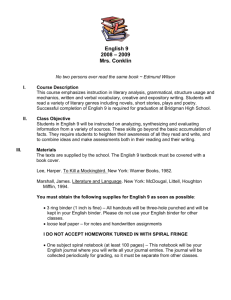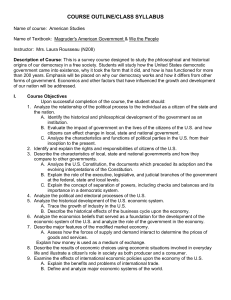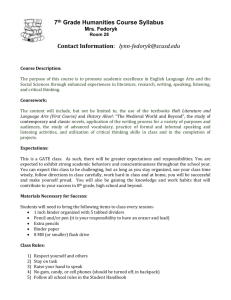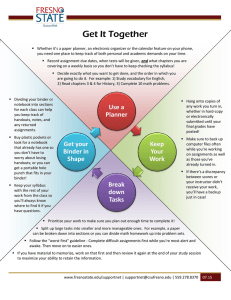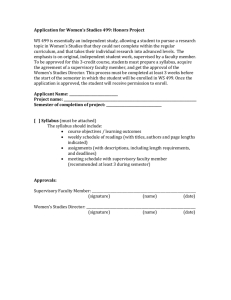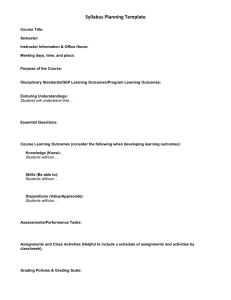Honors English IV Course Description Carrie Bunch, Teacher Barren County High School
advertisement
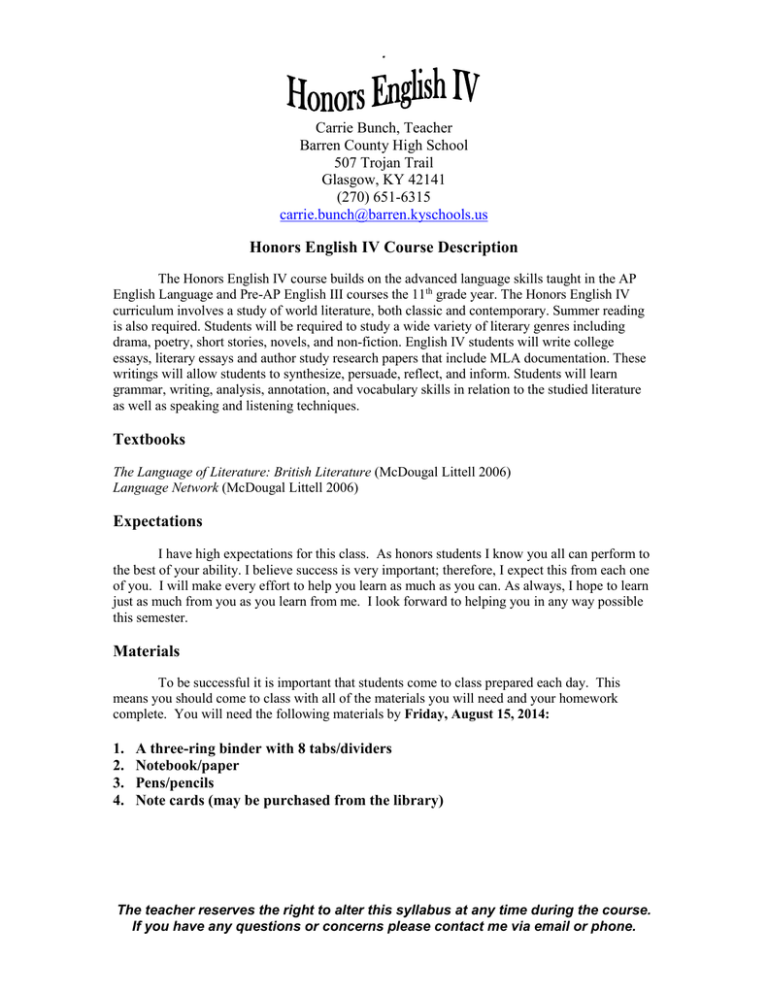
. Carrie Bunch, Teacher Barren County High School 507 Trojan Trail Glasgow, KY 42141 (270) 651-6315 carrie.bunch@barren.kyschools.us Honors English IV Course Description The Honors English IV course builds on the advanced language skills taught in the AP English Language and Pre-AP English III courses the 11th grade year. The Honors English IV curriculum involves a study of world literature, both classic and contemporary. Summer reading is also required. Students will be required to study a wide variety of literary genres including drama, poetry, short stories, novels, and non-fiction. English IV students will write college essays, literary essays and author study research papers that include MLA documentation. These writings will allow students to synthesize, persuade, reflect, and inform. Students will learn grammar, writing, analysis, annotation, and vocabulary skills in relation to the studied literature as well as speaking and listening techniques. Textbooks The Language of Literature: British Literature (McDougal Littell 2006) Language Network (McDougal Littell 2006) Expectations I have high expectations for this class. As honors students I know you all can perform to the best of your ability. I believe success is very important; therefore, I expect this from each one of you. I will make every effort to help you learn as much as you can. As always, I hope to learn just as much from you as you learn from me. I look forward to helping you in any way possible this semester. Materials To be successful it is important that students come to class prepared each day. This means you should come to class with all of the materials you will need and your homework complete. You will need the following materials by Friday, August 15, 2014: 1. 2. 3. 4. A three-ring binder with 8 tabs/dividers Notebook/paper Pens/pencils Note cards (may be purchased from the library) The teacher reserves the right to alter this syllabus at any time during the course. If you have any questions or concerns please contact me via email or phone. . Every day you should come to class prepared with your binder, paper, pen/pencil, and any other materials needed for that day, such as books. Your binder will be used every day for your daily work, reading notes, class notes, etc. For your binder you will need dividers. The divisions of your binder should be labeled in the following order: 1)General Resource (Syllabus, Clock Buddies, etc…), 2)Bell work, 3)Poetry, 4)Novels & Short Stories, 5)Drama, 6)NonFiction, 7)Research, and 8)Essays/Writing. Random binder checks will take place throughout the semester. I will also recommend that you purchase a jump drive to save your work. Disciplinary action may be taken if you fail to come to class prepared. Your first binder check will take place on Friday, August 15, 2014. Classroom Guidelines 1. 2. 3. 4. 5. Always be respectful to yourself & others. Be on time & prepared for class. Follow all school rules & procedures. Follow directions the first time they are given Have a positive attitude & be ready to learn! Procedures *Arrival and Dismissal: When the bell rings you should be in your seat and ready to begin class. You may not “pack up” early. Remain seated until the bell rings. There will be NO standing at the door. *Assigned Seating: You will be given an assigned seat and you will be required to sit there daily. *Daily Work: Every day when you come to class there will be an assignment ready for you to begin. This assignment may be your bell work. It may be journal writing for the day, a grammar exercise, ACT prep, spelling, reading response, etc. You should begin this assignment as soon as you enter the classroom. All bell work assignments will be recorded on a specific sheet provided by the teacher and will be turned in each Friday for grading purposes. *Make-Up Work: Make-up work/tests shall be permitted for excused absences only. Students having excused absences shall be allowed the same number of days to complete make-up work/tests as they were absent (i.e. student missed Monday, Tuesday, and Wednesday then they have 3 days to make up work/tests). It is your responsibility to find out what you have missed when you are absent. Feel free to email the teacher to receive your missed assignment before you return to school or access the class website for handouts. Remember to check the absent work folders for missed assignments. *Late Work: If, for some reason, you are unable to turn in your homework on time, I will allow you one extra day unless the assignment is being discussed in class OR it is part of a long term assignment and the due date has been announced in advance. For example, if you have a project to turn in that has been assigned for a month I will not allow it to be turned in late or if you have a poetry response due and you do not come to school you should email it before the school day ends on the date it is due. Also, your work is due when you enter the classroom. This does not mean you will be allowed to print something after the bell rings, nor will you be able to finish work during class time. Everything is due when class starts. No papers will be taken after the one-day late period. There will be a point deduction on all late work. The teacher reserves the right to alter this syllabus at any time during the course. If you have any questions or concerns please contact me via email or phone. . *Semester Test Policy: All students are required to take semester tests in all classes. The semester exam is worth 20% of your final grade. *Cell Phones and Ipods/MP3s: Cell phones and ipods/MP3s are not allowed in the classroom. Items will be confiscated and you will be written up if you do not follow the policy. *Nooks, Kindles, Ipads, and other electronic devices: We live in the age of technology and many of you have devices on which you read or do research. Feel free to bring your Nook or Kindle to class. You may use it at any time when you need to have access to your novel. However, if there is no need for you to have it out, then it should not be visible in the classroom. For example, if the class is watching a film there should be no reason for your Nook, Kindle, Ipad, etc…to be in use. I will ask you to put it away. Also, behaviors such as game playing and Facebook stalking are not allowed during English class, so if you are not reading your device should be tucked away. *Classroom Discipline: All of the rules and procedures of the school and classroom go into effect on the first day. If, at any time, your behavior becomes unacceptable you will be given a warning and then written up. I will call your parent/guardian to report your progress. *Hall Pass: In order to leave the room, you must ask for permission. Once permission is granted, you will sign the check-out sheet. The teacher will give you a hall pass since agenda books will no longer be used for this purpose. Only one person will be allowed out of the classroom at a time. Take care of all personal business during break time. Come to class with your materials because you will not be permitted to leave for that reason. If your leaving becomes a habit and starts to interfere with the learning process, hall pass privileges may be revoked. *Participation: I will be taking participation grades throughout the semester. It will be noted each time you actively contribute to the class. At the end of each class discussion or activity you will receive a participation grade. The more you are involved in your education the more you will learn. *Plagiarism and Cheating: According to Webster’s dictionary, plagiarism is taking ideas from another and passing them off as one’s own. Do not compromise your integrity by cheating or copying information from another source. Plagiarism and academic dishonesty are serious offences. The academic work of a student is expected to be his/her own effort. Students must give the author(s) credit for any source material used. To represent ideas or interpretations taken from a source without giving credit is a flagrant act. To present a borrowed passage after having changed a few words, even if the source is cited, is also plagiarism. Students who commit any act of academic dishonesty will receive a failing grade in that portion of the course work. Acts of academic dishonesty will be reported to the administration. The teacher reserves the right to alter this syllabus at any time during the course. If you have any questions or concerns please contact me via email or phone. . Writing Requirements ►All College Board Writing Standards 1-5 ◄ Reflective writing – Students will write college essays. These essays can be specific in nature (if the student knows exactly what a particular university wants) or they will be more broad and generic so that they may be applied to multiple essay topics, both for college admittance and scholarship awards. Analytical writing / Essay writing -- Essay writing involves students drawing upon textual details to develop an extended explanation/interpretation of the meanings of a literary text through analysis, synthesis, and evaluation. Documentation and Research writing -- The students will be asked to do a literature-based research paper. They must create a thesis statement about a common thread found throughout the chosen works of literature and develop the research paper based upon their focus. The paper will consist of 3-4 sources and the students will learn and use MLA style formatting. (Honors class requirement - - your average will be incomplete without completion of this paper.) You will earn an incomplete for the grading period if this isn’t completed, which ultimately means that you will not receive credit for this class, and therefore, will not graduate. The final paper will count as two 100-point grades. Writing to demonstrate learning/understanding -- During the various studies of literature, students will be asked to write informally and through exploration to demonstrate understanding of text. Assignments such as reading logs, journals, free writing, and annotation are included. Additional Writing Requirement-* Polishing, revision, and writing of portfolio pieces. The Kentucky Department of Education continues to require that each student complete a writing portfolio before graduation. Units of Study/Literature In this class, we will use the literature textbook as well as individually assigned novels in order to complete the various units of study in Honors English IV. Grammar textbooks and lessons will also be utilized throughout the literature and writing units. The following units are in no particular order and the literature could very well change. Summer Assignment The Kite Runner by Khaled Hosseini (20th century American) Year Long Assignment (Overview of all aspects of this class How to Read Literature Like a Professor by Thomas Foster This book provides a road map of how to approach literature critically. Through these works a framework for approaching literature will be established. A study of how theme is developed through figurative language and author's style will be studied. You will also begin studying narrative style, imagery, and tone. The teacher reserves the right to alter this syllabus at any time during the course. If you have any questions or concerns please contact me via email or phone. . ►College Board Standard 1: Comprehension of Words, Sentences, and Components of Texts◄ Point of View "The Yellow Wallpaper" by Charlotte Perkins Gilman either Tim O'Brien book The Things They Carried or Going after Cacciato (20th century American) "The Lady and Her Pet Dog" by Joyce Carol Oates and Anton Chekhov "To My Last Duchess" Robert Browning The premise of this unit will be point of view. However, throughout the study of the unit various skills / topics will be covered. Juxtaposition, allusion, and narrative structure will also be addressed. The recognition of elements of feminist literature and 17th century poetry will also be studied. Author's Style Macbeth by William Shakespeare (16th century British) Murder in the Cathedral by T.S. Eliot (20th century American) By reading Murder in the Cathedral, the students will be learning about the wheel and still point, symbols, themes, dilemma, etc. ►College Board Standard 3: Author's Purpose, Audience, and Craft◄ Satire (Tone) Various Flannery O'Connor short stories ("A Good Man Is Hard to Find", "Revelation", "Good Country People") (20th century American) "The Fall of the House of Usher" by Edgar Allan Poe (19th century) Tone The Metamorphosis by Franz Kafka (20th Century German) During this study, students will learn to identify the Kafkaesque quality of literature which revolves around his use of absurd occurrences and tone of helplessness. Students will study the symbolism behind Gregor Samsa’s transformation and the how this novel is an example of political allegory. The Glass Menagerie by Tennessee Williams Macbeth by William Shakespeare "Out, Out" by Robert Frost Other skills addressed in this unit will be juxtaposition and paradox, imagery, narrative structure, dramatic irony, and elements of tragedy. The teacher reserves the right to alter this syllabus at any time during the course. If you have any questions or concerns please contact me via email or phone. . Presentations ►College Board Speaking Standards 2 and 3: Speaking in Interpersonal Contexts and Preparing and Delivering Presentations◄ At various times throughout the year, students will be involved in group and individual projects which will entail standing in front of the class and presenting their findings to their peers. Students are expected to present professionally. The speeches should be mostly memorized and they should always have visuals. Each assignment will have its own rubric. Poetry Poetry is an essential part of this course. Several units during the course of the year will be devoted to poetry. Possible homework assignments may include doing a TP-CASTT over an assigned poem or completing a DIDDLS sheet. The TP-CASTT and the DIDDLS sheets allow you to dissect the poem line by line. You will be asked to identify tone and elements of diction and syntax that create that tone. On the assigned day for poetry, we may, as a class, discuss the poem. During our study of poetry, we may address the poetry of William Wordsworth, Robert Frost, Robert Browning, Emily Dickinson, Anne Bradstreet, Walt Whitman, William Blake, Theodore Roethke, Thomas Hardy, T.S. Eliot, E.E. Cummings, Gwendolyn Brooks, Wallace Stevens, Alfred Lord Tennyson, Sylvia Plath, William Shakespeare, William Burns, William Butler Yeats, Edna St. Vincent Mallay, Elizabeth Bishop, D.H. Lawrence, Christina Rossetti, Edgar Allan Poe, John Keats, John Donne, Seamus Heaney, and others as they arise. Short Stories Over the course of the semester, we may work with many prose pieces by various authors. I will pick stories related to our class unit at the time, such as theme development, diction and/or syntax use, and/or author. Stories that I do each year are as follows (some are not found in the text.): "A & P" --John Updike "Hills Like White Elephants" --Ernest Hemingway "The Death of Ivan Ilych" -- Leo Tolstoy "Young Goodman Brown" --Nathaniel Hawthorne "The Rocking Horse Winner" -- D.H. Lawrence "The Lottery" -- Shirley Jackson "The Lesson" -- Tony Bamberra "Once More to the Lake" -- E.B. White "The House of Mango Street" --Sandra Cisneros (1995 Q2 and 1997 Q2) Additional literature possibilities: -Poetry (epic and romance): Beowulf, Sir Gawain and the Green Knight, Le Morte d’ Arthur, The Canterbury Tales -Possible Novels: The Things They Carried, In Country, In the Lake of the Wood Cold Sassy Tree, Catcher in the Rye, Speak, The Help, The Hunger Games and Rocket Boys. Also, one outside novel will be required. The teacher reserves the right to alter this syllabus at any time during the course. If you have any questions or concerns please contact me via email or phone. . Grading Policy You will be graded on a point system. Each assignment, test, and piece of writing will be given a point value. Your grade will be based on how many you get correct. Most tests will be worth 100 points, with other assignments varying. A rubric will accompany assignments in order to let you know what is required to earn a particular score. REMEMBER: I am here to help you in any way I possibly can! I am looking forward to this school year and I expect you all to do well in Honors English IV. Please detach and return this portion of the page only Student Signature: ______________________________________________________ Parent/Guardian Signature: _______________________________________________ Your signature confirms that you agree with the above guidelines for your child’s class and will earn him/her 10 points of extra credit if it is returned by the due date. Please feel free to contact me any time during the school year with questions, concerns, or to discuss your child’s progress. You may reach me at school until 3:30 each day at (270)651-6315 or by email at carrie.bunch@barren.kyschools.us. Additionally, I will use the Remind system this year (formerly known as Remind101). Remind is a one-way text messaging and email system which will allow me to keep students informed and send reminders or updates. This will be especially helpful before tests or projects are due. If you would like to receive texts or emails about the course or upcoming assignments, see the attached sheet for instructions. How can I reach you? Please include your contact information below. □ Parent/Guardian email address: _____________________________________ □ Parent/Guardian phone number:_____________________________________ The teacher reserves the right to alter this syllabus at any time during the course. If you have any questions or concerns please contact me via email or phone. . The teacher reserves the right to alter this syllabus at any time during the course. If you have any questions or concerns please contact me via email or phone.

